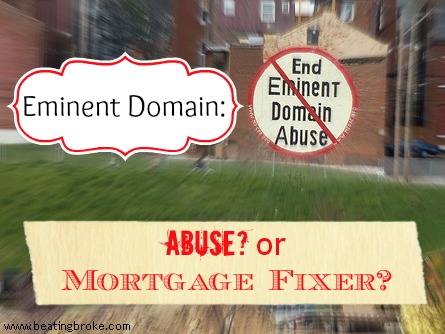The housing crash of 2008 is still sitting heavy on many homeowners. Many who bought a house during the peak of the market were left with houses that they’d bought at nearly twice the current value of the home. Much has been said about the dilemma that those homeowners find themselves in. As the economy receded, so too did their jobs, and their pay, causing many to simply walk away from their homes when they could no longer afford the mortgage.
Foreclosure is a bit of a messy deal. The bank takes the home back, and then sells it, attempting to recoup some of the value of the mortgage. We’ve seen many different methods of attempting to avoid the bulk foreclosure of homes in America. From Government sponsored programs that help with restructuring of the loan, to banks voluntarily restructuring the loan, to what is a rather disturbing new program in Richmond, CA.
The program is laid out in this recent article on CNN Money. (California city’s drastic foreclosure remedy: seizure) In the article, the City has started a program to attempt to purchase the mortgages of many underwater loans in the city. It’s an attempt to avoid the decline of low-income neighborhoods, and those neighborhoods already hit hard by the economy. Seems pretty normal, until you read a bit further.
But if the holders of the loans, who are mostly investors, refuse to sell by Aug. 14, the city said it will invoke eminent domain to seize the mortgages so it has more control over the process of making them affordable.

There are several things at play here. I don’t argue that there are many who are nearing foreclosure, and that in many cases, they were preyed upon by the banks and investors by being given loans for houses they couldn’t afford in the first place. I don’t think that excuses the buyers from not knowing that they couldn’t afford the mortgage. I’m sure there are those that could afford the house at the time of purchase, but have since fallen on hard times. In some cases, I do think that there should be something in place to help people ease the pain of their mortgage. But, that’s another article.
Back to Richmond, CA, and their silly new program. They plan on using eminent domain to seize the mortgage. As is pointed out in the CNN Money article, eminent domain is usually used by public entities to seize physical properties to make way for public parks, malls, and right-of-ways for transportation initiatives.
[Tweet “The city of Richmond, CA is threatening to use eminent domain to seize the mortgages of home nearing foreclosure.”]
The article alludes to the fact that eminent domain, to be legal, must be used for that are in the public interest. Meaning that the people of the city (or neighborhood) must have something to gain from the seizure. I think this is a bit of a grey area, and is likely to end up in court. It’s legality, in the seizure of only certain mortgages, and not the mortgages of the entire neighborhood, makes its usage for the public interest somewhat shaky. After all, who among us wouldn’t want to participate in a program that cut our mortgage in half and reduced the payments by the same? Absolutely! But, who among us has anything to gain by having our neighbor across the street participate in the program, and not us? Yeah. Even if I can afford my mortgage, I’d be a bit jealous. If I really wanted to cause a scene, I’d sue the city.
Legality aside, I still think the program is a mistake. Many places around the country are facing the same dilemma, and many are trying to find innovative solutions to fix the problem. The city of Detroit just declared bankruptcy because the population of the city, and thus it’s tax-base, has dropped so drastically over recent years. Perhaps the city of Richmond fears the same problem. What they should be spending their time fixing, however, is their local economy. They’ll spend all kinds of money executing this program, then defending it in court, only to still have the same economy.
If they can find ways to improve the economy by pushing local businesses, promoting local producers, and making improvements to the structures to do so, I think they’ll find that many of those foreclosures start getting picked up by new homeowners.
Maybe I’m wrong. I’m certainly not an expert in economics, least of all economics in California. What do you think? Is the usage of eminent domain here a valid one? Will it be challenged legally? How would you feel if your city had a program like this?
Original image credit: End Eminent Domain Abuse by Paparutzi, on Flickr

I started this blog to share what I know and what I was learning about personal finance. Along the way I’ve met and found many blogging friends. Please feel free to connect with me on the Beating Broke accounts: Twitter and Facebook.
You can also connect with me personally at Novelnaut, Thatedeguy, Shane Ede, and my personal Twitter.

I think that this is way beyond what the purpose of eminent domain is designed for. I see what they’re trying to do but the way that they’re going about it if they do indeed take this step is not correct.
I agree with Money Beagle. This appears to be well beyond acceptable use for eminent domain. I’m not an expert, so just speaking from gut reaction.